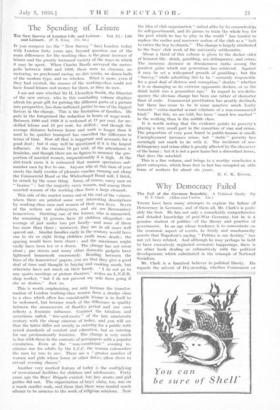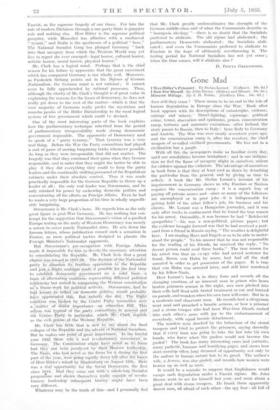Why Democracy Failed
The Fall of the German Republic. A Political Study. By R. T. Clark. (Allen and Unwin. 15s.) THERE have been many attempts to explain the failure of Democracy in Germany, and of them all, Mr. Clark's is prob: ably the best. He has not only a remarkably comprehensive and detailed knowledge of post-War Germany, but he is a genuine student of politics—of the theory and practice of government. In an age whose tendency is to concentrate on the economic aspect of events, he firmly and unashamedly asserts that Napoleon's saying, " Politics is our destiny," has not yet been refuted. And although he may perhaps be held to have excessively neglected economic happenings, there is no other book dealing so exhaustively with the political. developments which culminated in the triumph of National Socialism.
Mr. Clark is a fanatical believer in political liberty. He regards the advent of Dictatorship, whether Communist or
Fascist, as the supreme tragedy of our times. For him the rule of modern Dictators through a one-party State is gangster rule and nothing else. Herr Hitler is the supreme political gangster, while Mussolini has . affinities with a mediaeval " tyrant," and Stalin is the apotheosis of a political " boss." The National Socialist Gang has plunged Germany " back into that savagery from which the..Western World may yet live to regret she ever emerged—legal horror, cultural horror, artistic horror, moral horror, physical horror." Mr. Clark has a logical mind. Perhaps that is the chick reason for his failure to appreciate that the great movement which has conquered Germany is not wholly evil. Moreover; as Frederich Sieburg points out in his Defence of German Nationalism, the German mind is not rational ; it cannot even be fully apprehended by rational processes. Thus,, although the clarity of Mr. Clark's thought is of great value in explaining the reasons for the fiasco of democracy, he does not really get down to the root of the matter—which is that the vast majority of Germans really prefer the mysticism and mumbo jumbo of the Hitler Dictatorship to the most logical system of free government which could be devised.
One of the most interesting parts of the book explains how the parliamentary technique inherited from the period of parliamentary irresponsibility made strong democratic government impossible. The opponents of Democracy used to speak of a " party tyranny." That tyranny was a very real thing. Before the War the Party committees had played a sort, of game of scoring bargaining tricks whenever possible; As long as they were irresponsible that did not matter. The tragedy was that they continued their game when they became responsible, and in order that they might the better be able to play it they did everything they could to keep the party, leaders and the continually shifting personnel of the Republican cabinets under their absolute control. Thus it was made practically impossible for the German Republic to throw up a leader at all ; the only real leader was Stresernarm, and he only retained his power by eschewing domestic politics and concentrating all his efforts on Foreign Affairs. Even he had to waste a very large proportion of his time in wholly unprofit- able bargaining. Strcsemann is Mr. Clark's hero. Ire regards him as the only great figure in post-War Germany. He has nothing but con- tempt for the suggestion that Stresemann's vision of a pacified Europe resting on the unity of Western Democracy was merely a screen to cover purely Nationalist aims. He sets down the famous letters, whose publication caused such a sensation in France, as mere political tactics designed to placate the Foreign Minister's Nationalist opponents. But Stresemann's pre-occupation with Foreign Affairs Made it impossible for him to devote. the necessary attention
to consolidating the Rept, bl ic. Clark feels that a great
el/inlet, was nlissed in 1927-28. 'Ihe decision of (la.Nii I ionalisi
, ,
party to akindon its Iiuitl ss opposition to the Republic and join a Right coalition made it possible for _the first time to establish democratii. government On a solid bask -2-a basis of, alternating coalitions representing different pOlit tendencies but united in recognizing the Weimar constitu lion
. as a &tune-work In,' political activity. Stresemann, had he
haul leisure is reflect on dolnest:ie polities. would probably h4ve appreciated this. But nobody else did. The Hight, coalition Was_ broken by the Centre Party eninmit Ice (;\'(4
1
a ;Imat ter of minor iMportance- -- an edtic:Itioli adtion wits typical of the party committers in general 111(1 the Centre i'arty in particular, which Mr. Clark 1.egiii.ds as the 'evil, genius (d the Wciniar Repuhl ie.
Mr. Clark has little that is new to SaY about. the final collapse of the Republic and the at Nal ional Socialism. But he makes one point of great hilimrt once, In the fateful year 1932 there was 'a real le\ olutional■ inoN enicill.in Germany. The Cominunists might have acted as it focus had they not, bjen Paralysed by their Moscow leadership. The Nazis, who had acted .as the focus for it during the first part of the year, were going rapidly down hill after tile iiirtsco of Herr Hiller's rebuff by Hindenburg on August 13th. Ifek was a real opportunity for the Social Democrats, tie first since 1918. Had they come out with:a whole-hog Socialist programme and shown themselves really capal.)le -of revolu- tionary leadership'. Subsequent history might • have been very different.
Whatever may be the truth of this—and I personally feel
that Mr. Clark greatly underestimates the strength of the German middle-class and of what the Communists describe as ".. bourgeois ideology "—there is no doubt that the Socialists preferred to abdicate. The old regime had abdicated ; the parliamentary Democrats abdicated ; the Socialists abdi- cated ; and even the Communists preferred to abdicate to FaSeism in the hope of ultiinatery overthrowing it. The testing period for National Socialism has not yet come ; when the time comes, will it abdicate also ?
H. POWYS GREENWOOD.















































 Previous page
Previous page